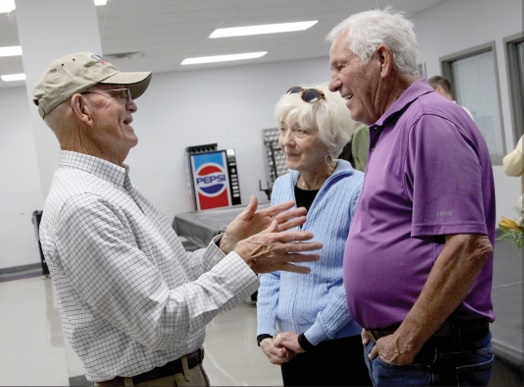Proposed ban on medical transitions for minors gains renewed traction
The Republican leader in Missouri’s Senate confirmed Tuesday her chamber will debate legislation seeking to ban transgender children from seeking gender- affirming care.
Senate Majority Leader Cindy O’Laughlin, R-Shelbina, assured State Sen. Mike Moon, R-Ash Grove, that his legislation will get time in front of the full Senate.
Moon is sponsoring one of three bills seeking to stop Missouri practitioners from prescribing puberty blockers and cross-sex hormones or performing surgical transition. The bills would also block doctors from giving referrals to patients to see others that could provide gender-affirming care. Already this session, bills aiming to ban transgender students from participating in a gender-specific sports team and to ban transgender people from altering their birth certificate to reflect their gender identity have been heard.
The Senate Emerging Issues Committee heard testimony on the three bills Tuesday, but much discussion diverted from statewide care and focused on one center providing gender-affirming care: the Washington University Transgender Center at St. Louis Children’s Hospital.
Last week, former case worker Jamie Reed alleged the Transgender Center overlooked mental health needs of patients and did not inform adolescents and their parents of potential side effects of treatment in an article in a national publication. Missouri Attorney General Andrew Bailey subsequently announced his office has been investigating Reed’s former employer.
Moon has had contact with Reed’s attorney, Vernadette Broyles, through an intermediary, he told The Independent. He was hoping Reed would testify in favor of his bill Tuesday, but she did not attend the hearing.
Moon characterized the center as “a conveyor (belt) of child destruction” operated by “evildoers.”
Sen. Denny Hoskins, R-Warrensburg, introduced his bill by reading from Reed’s article in The Free Press, ditching a script he had written prior to Reed’s publicity.
“I don’t have anything against transgender kids. I don’t have anything against transgender adults. But in my mind, we have to protect the kids,” Hoskins said as he finished his remarks. “These kids are not old enough to make these decisions for themselves.”
Moon told The Independent Tuesday’s hearing was planned prior to Reed’s announcement.
He came to justify his bill with 300 witness forms, he said during the hearing. A member of his staff coordinated favorable witness testimony, poking people when it was their turn and telling others to wait.
The two sides, in favor and opposed, each had studies on hand to show the mental health ramifications of hormone therapy. Some said it helps; some said it hurts.
Brandon Barthel, a doctor of endocrinology at University Health’s LGBTQ Specialty Clinic in Kansas City, gave his experience treating transgender adults.
“I can tell you firsthand that transgender individuals are not being rushed into treatment,” he said. “Quite the opposite. The majority wait years before they can access care. And for many of my patients, they suppress their gender identity for long periods of time for fear of backlash.”
Barthel said patients feel “peace” once they begin their medical transition.
Sen. Nick Schroer, R-O’Fallon, asked Barthel about Reed’s affidavit.
“If all of these allegations were taken as true in your expert opinion,” Schroer said, “would you equate that to medical malpractice?”
Barthel said he has concerns if the allegations are true. He said they are contrary to transgender medicine’s standards of care, as established by the World Professional Association for Transgender Health.
Schroer asked the same question to all witnesses opposing the bills. All answered similarly to Barthel, expressing skepticism of Reed’s story.
“Without speaking to this particular individual, one thing that you learn as an attorney is that people do misrepresent themselves in affidavits,” said Casey Pick, director of law and policy for the Trevor Project, an organization that focuses on the mental health of LGBTQ youth.
Luka Hein testified Tuesday that he received care in Nebraska to transition when he was a teenager that he now regrets. She was one of two people who told the committee that their medical transition was a mistake.
“I was affirmed on a path of permanent medicalization at 16,” Hein said. “As a result of this, I am now 21 and trying to go back and I’m unable to. I felt a need to escape my body as a result of my poor mental health at the time. I can’t really take back a lot of what happened to me — I care about kids. I work with kids.”
Moon told The Independent the people who have come to regret their medical transition are his motivation for introducing the legislation.
“We often say, ‘If it saves one life, do whatever it is,’” Moon said. “Well, here we are now with three on the same day that have come to testify, ‘This is wrong.’” Members of the opposition, however, did not accept the premise that denying children treatment is helpful. One 18-year-old who is transgender testified that access to medical care was essential to their safety.
Witnesses were twice reminded by Sen. Justin Brown, R-Rolla, the chairman of the committee: “We’re not gonna do this… I am not going to tolerate disrespect to any committee member regardless of what side you’re on.”
His warning was issued before a man, who is transgender, testified in favor of the bill and became upset. He was eventually removed from the committee room for repeatedly exclaiming “Shame on you!” despite warnings from Brown.
The committee did not take action on the bills Tuesday.




